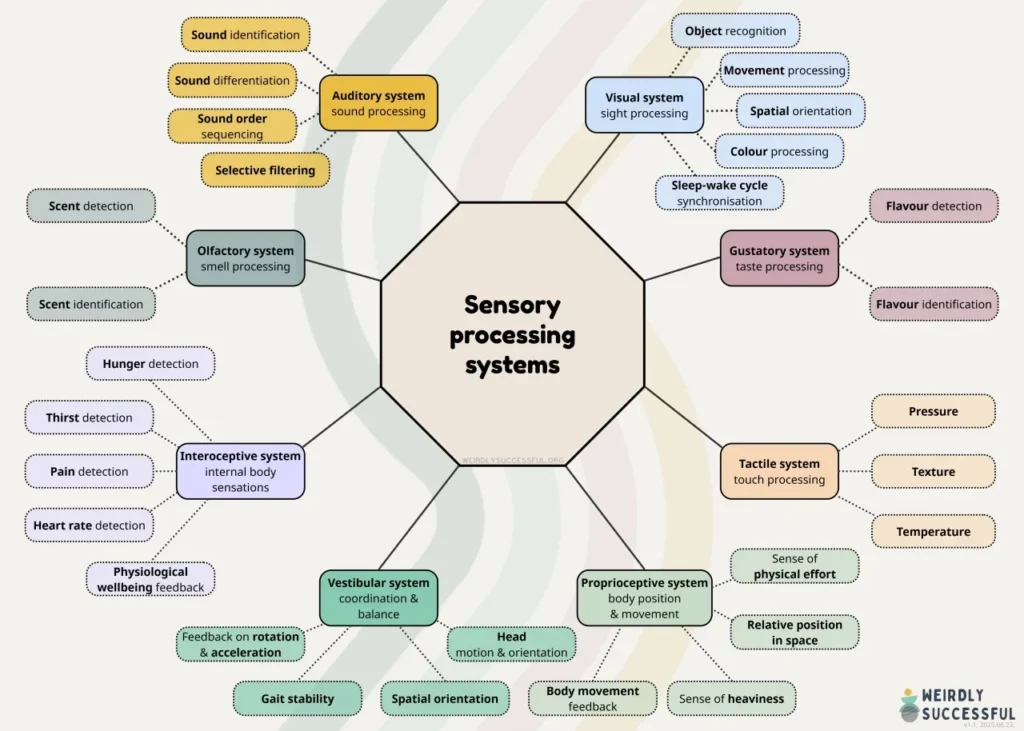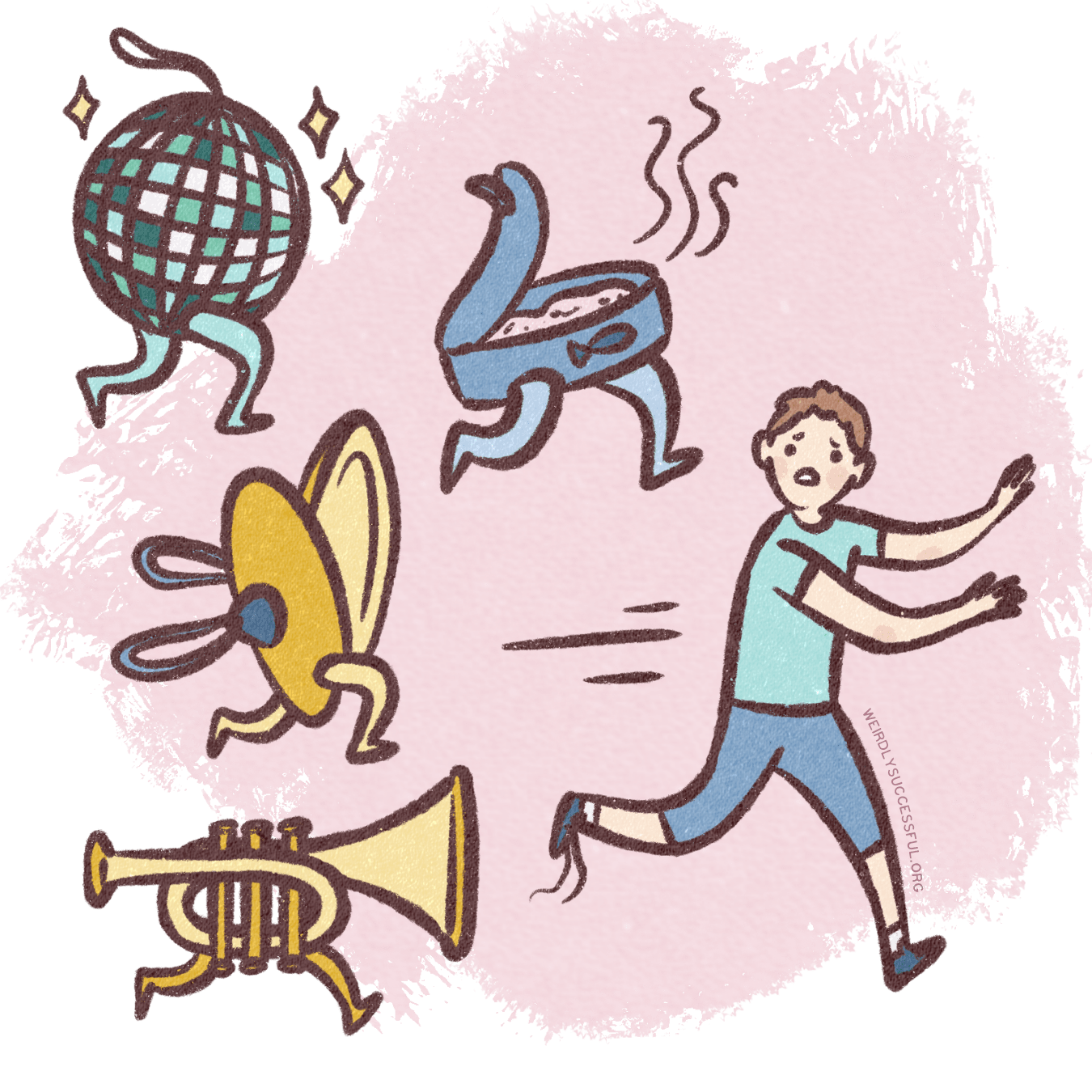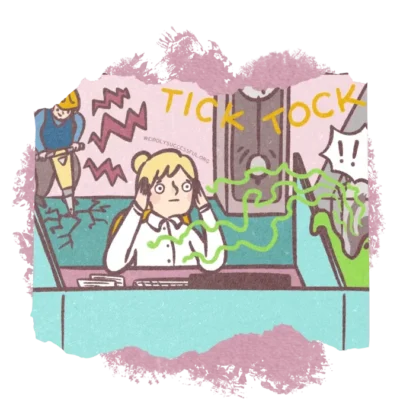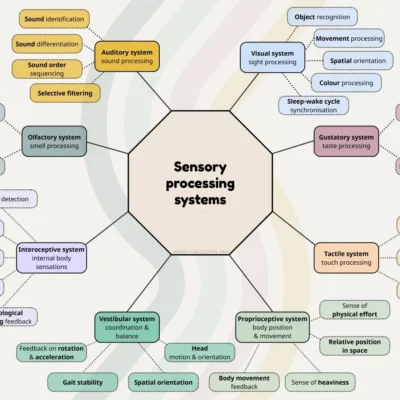Sensory processing difficulties are a group of traits associated with neurodivergence. They’re part of the wider group of sensory processing differences, meaning all the ways neurodivergent brains handle sensory information differently from neurotypical peers.
Any of the brain’s 8 sensory processing systems can be affected by processing difficulties. Each of the five classic senses (sight, sound, taste, touch, and smell) have their own processing system in the brain. So do the other three, less known senses: interoception (picking up on internal body cues), proprioception (body position and movement), and the vestibular system (balance and coordination).

There’s a huge variability of sensory experiences leading to highly individualised profiles when it comes to sensory difficulties. Like in other areas of neurodivergence, there’s no one-size-fits-all sensory profile. One person’s sensory needs, requirements, strengths and sensibilities will be completely different from someone else’s.
The brain has a tendency to try and compensate for sensory difficulties by relying on other systems (which might or might not have their own issues), which means that with no comparison, many neurodivergent people don’t realise that a certain problem might be sensory in nature. The poor overall knowledge of sensory processing systems also means that sensory difficulties are often not picked up on by others.
As a result, sensory processing difficulties can be an invisible toll for neurodivergent people of all ages. Learning about what they are and how they can show up can be crucial for energy management, neurodivergent self-care, determining accessibility needs and ensuring long-term mental and physical health.
In this article, you’ll find a handful of questions and answers to orient yourself in the world of sensory processing differences and difficulties, complete with helpful diagrams and illustrations, as well as a categorised guide to all the sensory terms in neurodivergence from across our neurodivergent glossary.
Get our Sensory Systems Guide as a PDF
Download now from The Library, our free resource hub for neurodivergent folks and those who support them.

Table of Contents[Hide][Show]
What do sensory difficulties look like?+−
- Aren’t problems with the hearing, vision and so on, related to the ears & eyes etc.?
- How do I tell if I have sensory difficulties or sensory sensitivities?
- Why haven’t I heard of these before?
- Can people with sensory issues just ‘tough it out’ and ‘deal with it’? We all see and hear the same things, no?
What do sensory difficulties look like?
In children, sensory difficulties have often historically been misidentified as behavioural problems. Difficulties processing taste or touch, for example, is often attributed to ‘picky eating’.
For neurodivergent adults, on the other hand, sensory difficulties are often masked, like so many other neurodivergent traits do. This means that issues with sensory processing might be attributed to things like personal preference, liking or not liking certain sensory inputs, preferring to avoid certain contexts. When a physical intolerance to something is not a social norm, it often gets masked by pushing through.
As a result, for adults, sensory processing difficulties often show up in seemingly unrelated ways, like:
- being drained after spending time in certain environments,
- needing more time to recover after certain types of sensory experiences
- processing feeling slower in certain environments
This might mean that the brain might have to process more information through a suboptimal sensory system, or use extra power to handle the same amount of input.
Aren’t problems with the hearing, vision and so on, related to the ears & eyes etc.?
Issues with sensory processing are completely separate from issues with the organs themselves, but on the superficial behavioural level they might look like symptoms of other things, so processing difficulties often get mistaken for issues with the organs. For example, issues separating speech in crowds, understanding verbal instructions and strong accents will more likely get ascribed to hearing loss (ie. physical problems with the ear or the nerves in the ear), rather than signs of Auditory Processing Disorder (where the difficulty is in the brain).
How do I tell if I have sensory difficulties or sensory sensitivities?
You have sensory sensitivities when you have difficulties processing sensory inputs. So, it’s interchangeable. 🙂
Why haven’t I heard of these before?
Sensory processing difficulties exist in a weird inbetween space: there are a huge number of known sensory differences, and they’re widespread across ADHD, Autism and other neurodivergent conditions, yet they often go under the radar. This is because they’re not part of most screeners and assessments, unless people come specifically through diagnostic pathways like Auditory Processing Disorder or Specific Learning Differences.
Can people with sensory issues just ‘tough it out’ and ‘deal with it’? We all see and hear the same things, no?
There’s no evidence that willpower or behavioural changes reduce the sensory toll taken on the brain and the body.
Meaning: asking people to just put up with a sensory difficulty or just tolerate it better can be actively harmful (ie. just because you can tolerate a sledgehammer pounding next to your desk for eight hours a day doesn’t mean others can).
The best way to support sensory processing issues is careful assessment, and context-based accommodations and adaptations.
Categories of sensory terms
Sensory basics
hypersensitivity
Hypersensitivity, also known as sensory over-responsivity, is a condition characterized by an extreme sensitivity or heightened response to sensory stimuli from the environment. Individuals with hypersensitivity may have a seemingly exaggerated reaction to various sensory inputs, such as sound, touch, taste, smell, or visual stimuli. These sensitivities can result in discomfort, distress, or even pain, …
hyposensitivity
Hyposensitivity, also known as sensory underresponsivity, is a condition characterized by a reduced sensitivity or diminished response to sensory stimuli from the environment.
Individuals with hyposensitivity may have difficulty with detecting or processing sensory inputs, such as sound, touch, taste, smell, or visual stimuli. They may require more intense or prolonged sensory stimulation to register and respond to the sensation.
sensory avoiding
Sensory avoiding, also known as sensory under responsivity, refers to a pattern of behaviour where individuals actively try to avoid or minimize exposure to sensory stimuli. These individuals may have a heightened sensitivity to sensory input and may find certain sensations overwhelming or discomforting. As a result, they may engage in behaviours such as avoiding …
sensory-seeking
Sensory-seeking refers to a behavioural pattern or tendency in individuals where they actively seek out and engage in sensory experiences or stimuli. Individuals may have a heightened desire for sensory input and actively seek activities or environments that provide intense or stimulating sensations.
habituation
Habituation is a biological reaction mechanism where if a non-threatening stimuli keeps repeating, the response to it lowers over time. In neurodivergence, the brain’s reduced capacity for habituation means we can’t "tune out" unimportant stimuli, which leads to sensory difficulties and sensory overwhelm.
Sensory Processing Disorder (SPD)
Sensory Processing Disorder (SPD) is a potential grouping of sensory processing difficulties. As individual sensory processing difficulties are spread across a wide range of diagnoses, SPD is often used as a shorthand to describe significant neurodivergence-related sensory issues that are persistent in a person’s life and limit their participation in everyday life, regardless of what diagnosis they would officially belong to.
Balance & coordination
proprioception
Proprioception refers to the sensory system that provides information about body position, movement, and spatial orientation without visual input (i.e. knowing where our body parts are without having to look at them).
vestibular system
The vestibular system is a sensory system located in the inner ear that detects head position and movement, working together with vision and proprioception (body position sense) to maintain balance and spatial orientation.
dyspraxia
Developmental Coordination Disorder is a neurological condition that affects motor skills and coordination. People with DCD can have trouble with balancing, or tasks that require fine motor skills like tying shoelaces, holding pens or cutlery.
Internal body sensations
alexithymia
Alexithymia is the inability to assign names to feelings, describe them to others or talk about them. It is considered a separate neuropsychological condition but has significant overlaps with autism.
interoception
Interoception is the ability to notice and identify feelings inside one’s body, like thirst or hunger. It also includes the ability to notice and regulate temperature changes or notice pain.
Terms related to the ‘classic’ senses
misophonia
Misophonia is a neurodivergent condition characterized by an intense emotional and physiological response to specific sounds. People with misophonia experience strong negative reactions, such as anger, anxiety, or disgust, when exposed to certain sounds. These sounds can vary from person to person but commonly include chewing, slurping, tapping, or repetitive noises.
ARFID
ARFID stands for Avoidant/Restrictive Food Intake Disorder. It is characterized by highly selective eating habits, often to the point of nutritional deficiency. Unlike anorexia or bulimia, ARFID is not driven by concerns about body image or weight. Instead, it’s typically related to sensory sensitivity, fear of adverse consequences (like choking or vomiting), or a lack of interest in eating.
Coping mechanisms
Negative outcomes of unmet sensory needs
verbal shutdown
Verbal shutdown is a temporary inability to produce speech despite having intact language and thoughts – an involuntary neurological response to overwhelm. It’s when words exist in one’s mind but cannot be physically spoken due to sensory, emotional, or cognitive overload.
Casually and incorrectly it is sometimes also referred to as ‘going non-verbal’, but this term is not preferred by the non-speaking autistic community.
autistic burnout
Autistic burnout refers to a state of physical, mental, and emotional exhaustion experienced by autistic people. It is a result of prolonged exposure to overwhelming sensory, social, and cognitive demands, often in an environment that does not accommodate their needs.
sensory overwhelm
A feeling of immense distress, a sensory overwhelm / autistic overwhelm is a strong reaction to stimuli caused by the compounded effects of stress, exhaustion, lack of safety, a sense of danger, unmet needs, too much information, noise, sights or sounds, smells or touch.
Sensory tools
stimming
Stimming (also known as self-stimulating) is a common sensory-seeking neurodivergent behaviour. It means stimulating yourself in a repetitive manner to self-soothe, regulate, or express excitement. Stimming is common both in ADHD and autism.
Stimming movements, however, are common in all human beings. Everybody stims, whether it’s chewing the end of a pencil while you think, swaying back and forth to the rhythm of the music while you’re standing in line, or swinging your legs when they can’t touch the ground.
auditory stimming
Auditory stimming is a natural self-regulatory behavior that involves making sounds with your voice, either through non-word vocalizations (vocal stimming) or speech-based expressions (verbal stimming). This form of stimming helps with emotional regulation, sensory processing, and achieving comfort and focus.
decompressing
Decompressing refers to engaging in activities or behaviours that allow a person to relax, unwind, and alleviate stress or sensory overload.
This term is particularly significant in the neurodivergent community as we often experience heightened sensitivity to environmental stimuli, leading to increased stress and anxiety levels.
Making sure to have time to decompress after especially taxing events is an essential part of self-care.
deep pressure
Deep pressure is a natural sensory need where firm, consistent pressure (like heavy blankets or tight hugs) helps tension melt away from your body. Many people naturally seek this through things like snug clothing or curling up under blankets – it’s your nervous system’s way of finding calm and comfort.
Neurology & neurobiology
stimulus
A stimulus (plural: stimuli) refers to any physical or sensory input from the environment that elicits a response or reaction from someone. It can be any sensory information, such as sound, light, touch, taste, or smell, that triggers a biological or behavioural response. Stimuli can range from simple to complex and vary in intensity and …
context switching
Context switching refers to the cognitive process of shifting attention between different tasks or mental states. It involves disengaging from one task and engaging in another, requiring the brain to change its focus, rules, and objectives.
This process can be mentally taxing due to the cognitive load involved in stopping one task and starting another, shifting gears to focus on the new task, and getting accustomed to the new situation with all its stimuli. Frequent context switching and jumping from task to task can lead to a decrease in productivity and efficiency.
Work-in-progress!
As we build out our fully illustrated glossary to neurodivergent terms, we know the list above is not exhaustive. There’s a lot more sensory terms that we’re still working on.
- Sensory diet
- Sensory toys
- Sensory integration therapy
- Auditory system (hearing)
- Visual system (sight)
- Tactile system (touch)
- Olfactory system (smell)
- Gustatory system (taste)
- Negative stimming
- …and more!
To get updates as we build out the glossary and get notified of our new resources, why not hop on our mailing list?
« Back to the index













